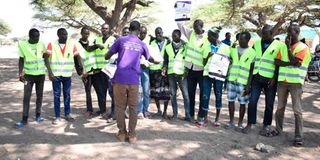Men pivotal in ending gender-based violence

Boda boda operators from Ngaremara in Isiolo County, receive reflectors bearing gender-based violence (GBV) messages during a training on prevention and response the vice, in September last year.
What you need to know:
- The Ministry of Public Service and Gender has run a national campaign against gender-based violence (GBV) through broadcast and social media since last week.
- Training men to be positive role models for their peers, sharing household responsibilities more equitably and speaking out against violence against women is among strategies to bolster men’s engagement in ending violence.
The Ministry of Public Service and Gender has run a national campaign against gender-based violence (GBV) through broadcast and social media since last week.
Through a 38-second campaign video, the ministry uses men to appeal to their fellow men to drop the toxic masculinities in favour of protecting women in the Kenyan society.
“It’s not a boys’ club if you’re an all winning. Be better and demand the same of those around you,” urges the man in the voice over.
Men are primarily pivotal in ending GBV in the homes and communities. Last year, National Crime Research Centre (NCRC) found that of the 2,416 GBV cases reported between January and June, 71 per cent were perpetuated by men aged 18 to 33.
Further, the 2020 Economic Survey Report established that between 2015 and 2019, a total of 4,000 rape cases were reported to have been committed by men.
In this respect, a campaign that targets men by men is crucially important to eliminate toxic masculinities.
There are various strategies to bolstering men’s engagement in ending violence against women as established by United States Agency for International Development (USAid) in its 2015 review of the respective strategies adopted in the Global South.
Positive role model
They include training men to be positive role models for their peers, sharing household responsibilities more equitably and speaking out against violence against women.
“We have to tackle the root causes of GBV like the social tolerance…the harmful masculinities (that portray) men as domineering,” UN Women country director Anna Mutavati said on June 24, during a virtual forum organised by Kenya Private Sector Alliance to discuss measures taken to tackle GBV in the private sector.
Ms Mutavati was also concerned that 30 to 50 per cent of the population in 11 countries in Eastern and Southern Africa support a husband beating up his wife, a social tolerance that threatens the fight against domestic violence in the continent.
Based on USAid’s review, converting men into allies in this front, requires the society to start moulding them when they are adolescents “at a time when both their gender identities and skills in gender relations are being formed.”
It also discourages against using a combative approach in seeking to influence male community and religious leaders to address harmful traditional practices.
“It is possible to engage male leaders in changing aspects of community life without challenging the patriarchal basis of their authority,” recommends the review report.





